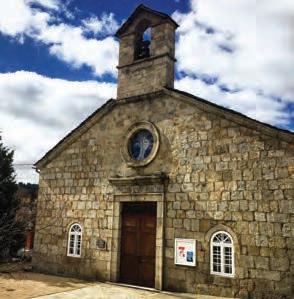
3 minute read
Radical acts of hospitality
RADICAL ACTS A tiny village uses weapons of the spirit to resist the weapons of war — and to save thousands of lives of
HOSPITALITY
Dawn is breaking on a fall day, 1940, in Le Chambon, a tiny village near the Alps in what was then German-occupied southern France. There is a quiet knock at a large green door. “Come, come in, yes, of course, come in,” says Magda Trocmé, throwing open the door and wrapping her arms around the desperate woman before her.
And so begins one of many days in a remarkable community that would help thousands of people escape to freedom during the Second World War. It’s a story so unlikely — yet so deeply, and fundamentally Christian — that Ambrose University’s Mark Buchanan, Associate Professor of Pastoral Theology, is compelled to share it with the world.
“They put their lives at risk to help others, displaying profound empathy,” Buchanan says of a Protestant community not known for being warm and friendly, but whose long history of merciless persecution by the Catholic majority gave them uncommon insight to pain. “Empathy and concern for the outsider was shaped over centuries of solid, steady biblical teaching and by having suffered grievously at the hands of the neighbours,” he says. “They ‘got it’ in a deep, deep way.
Lead pastor André Trocmé and his wife, Magda, had arrived in the village in the mid 1930s. Despite Trocmé’s many talents, his unwavering pacifism had fallen out of favour with larger, urban churches at a time of war. As that war proceeded, this brilliant man used his oratory skills to become a catalytic force urging members of his church to resist, rallying them to resist the weapons of war with weapons of the spirit.
“Trocmé’s conscience is stirred and he feels it is not right that he is safe in his little village while others are being hurt,” Buchanan says. “He glimpses his call, based on the biblical idea that the innocent or those who are being sought out of vengeance can find refuge. His community — a simple one composed mostly of farmers, cobblers, honey makers and others — will be a place of refuge.”
People on the run hear rumours about this place. Thousands, many of them Jewish, find their way to Le Chambon for help, often via the single rail line into the community. Children whose parents had been imprisoned arrive on their own.
“The Chambonais sheltered people and helped transfer them to safety, often to Switzerland or Spain,” Buchanan says. “What they did was highly organized and sophisticated. They falsified
(Top) A single rail line brought most of the refugees to the village, where the Trocmés and other Chambonais would be waiting to welcome those fleeing for their lives and enfold them into the life of the community. (Right) Le Temple du Protestants where Trocmé was lead pastor from 1934–46. The engraving in French above the door reads “Love One Another” — a perfect distillation of Trocmé’s faith and actions.
necessary documents, for example, and operated a major forgery operation out of a barn.”
Children were sheltered and educated in the village, which already boasted a high quality elementary school that had attracted students from across Europe. Money was gathered, teachers were recruited and curriculum developed. Children hid in plain sight.
Under the gaze of Vichy, Nazi, Gestapo and SS eyes, the community never flinched, nor gave up even one of the refugees. “Everyone took part,” Buchanan says. “Even if refugees were on some kind of wanted list, people continued to put their lives at risk. They were very stoic.” It comes as no surprise, then, that at the end of the war, when the Allies rolled through and liberated the region and many German soldiers were held at a nearby prison, Trocmé became their chaplain. “For Trocmé, it wasn’t about taking sides. It was about living out your faith in concrete ways. He didn’t know how or when to stop being a Christian.” p


The green door was the main entrance of the presbytery where the Trocmés lived — and often the first door refugees knocked on when arriving in Le Chambon.








